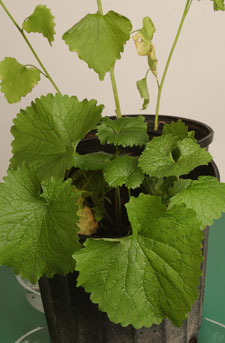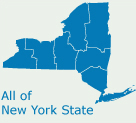Environment DEC

From the April 2008 issue
Funds Earmarked to Battle Terrestrial Invasive Species

Grants will help address eradication of invasive plants like garlic mustard
Ten municipalities and organizations will receive a total of $555,000 to help wipe out infestations of non-native terrestrial species across the state, DEC Commissioner Pete Grannis announced recently. The Terrestrial Invasive Species Eradication Grants will be used by recipients to help fight giant hogweed, mile-a-minute weed, pale swallow-wort and other invasive threats to New York's ecosystems.
Invasives Have Far Reaching Impacts
"Invasive species have far reaching environmental, recreational and economic impacts-they spread rapidly, out-compete native species, and disrupt native ecosystems and biodiversity," Grannis said. "These grants will help local communities and environmental groups in their work with DEC to actively address this growing problem."
Invasive species are non-native and can cause harm to ecosystems, food supplies, landscaping, industry and infrastructure. While some may pose a serious health risk, invasive species are also a threat to New York's biodiversity, second only to habitat loss. Invasives come from around the world and the rate of invasion is rising along with the increase in international trade that accompanies globalization.
In 2007, Grannis announced the availability of grants to municipalities, state agencies, and not-for-profit corporations for projects that help eliminate infestations of invasive species. State funds can be used to pay for up to half of the total costs of a selected eradication project. Grants for aquatic invasive species eradication programs were awarded separately earlier this year.
Best Potential for Long-term Reductions Awarded
For the terrestrial invasive species grants, DEC received applications seeking almost $1 million. A competitive evaluation process ranked and prioritized the proposals for the $555,000 in available funds. The projects selected were viewed to have the best potential for achieving long-term reductions in the presence of invasive species.
The Invasive Species Eradication Grant Program is among the first of many initiatives of the new Invasive Species Council. The council's first role will be to spearhead the attack on invasive species statewide by implementing the recommendations of the Invasive Species Task Force, which include organizing and funding regional partnerships for invasive species management, creating an invasive species research center, developing an invasive species database, and establishing an education and outreach program.
More Information
Grant awardees will still need to obtain any necessary state or federal permits and complete review under the State Environmental Quality Review Act (SEQR), if required, in order to obtain reimbursement. For additional information, please call DEC at 518-402-9425 or visit DEC's Terrestrial Invasive Species Eradication Grant Program web page. Also, see the full press release on which this story is based for brief descriptions of the funded projects.





